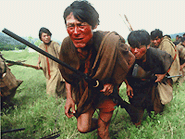One of the festival highpoints (and certainly one of my personal favorites) from this year’s slate of films from the Human Rights Watch International Film Festival is filmmakers Pamela Yates, Paco de Onís and Peter Kinoy’s exhaustive (and inspired) documentary, State of Fear: a sobering, trenchant, and disturbingly relevant dissection of Peru’s contemporary history through the socio-political framework of a protracted (and seemingly interminable) decades-long war on terror that had contributed to a demoralized culture of tolerated erosion of human rights, systematic military abuse, mass killings, torture, and fear-mongering political opportunism. The film traces the rise and fall of an underground, insurgent Maoist organization known as Shining Path that, under the direction of radical intellectual, Abimael Guzmán, seized on the desperate poverty and marginalization of the Andean indigenous people (living predominantly in rural areas) as an ideological rallying cry for social revolution and began to mobilize the peasants into a terror campaign with a strategy of violent revolution and scorched earth policy in order to (coercively) convert the rural countryside to their cause towards the greater path of encircling – and eventually capturing – the city of Lima. Unable to effectively identify Shining Path operatives – the faceless, anonymous enemy embedded from within the grassroots level – and weed out the real terrorists from ordinary civilians, the government empowered the military with broad, unchallenged authority to take any necessary action (at the expense of civil liberties) in order to stem the tide of domestic terrorism. In an incisive (and deeply unsettling) interview, a tribal elder recalls the incalculable devastation inflicted by the crisis on her people as Shining Path radicals first attempted to forcibly conscript some of the villagers, including children, to their bloody cause (and execute those who opposed them) then, after the group’s departure, were visited by the military who subsequently armed and recruited them into forming a civilian militia empowered to gather intelligence, torture, and execute terrorists, resulting in a gruesome and devastating (and unreined) tribal infighting that would nearly exterminate the entire village. Nevertheless, despite suffering through years of rural atrocities, domestic terrorism continued relatively unabated until Guzmán decided to accelerate the revolution and bring the war to Lima by initiating a campaign of random bombings throughout the city. It is within this atmosphere of desperation and chaos – a constant “state of fear” – that political outsider Alberto Fujimori ran a successful presidential campaign under the platform of waging a strong-armed war against terrorism. To this end, Fujimori suspended the national congress under a heightened – and indeterminate – state of emergency and concentrated power to the presidency. A Truth Commission member appropriately comments, “We traded our liberty for security.” Perhaps the most incisive and insidious aspect of Peru’s recent history lies in Fujimori’s calculated ability to maintain his continued grip on the centralized and corrupted power of the presidency even after Guzmán’s arrest by continuing to raise the specter of an unspecific terrorist threat despite the effective decapitation – and subsequent disintegration – of the Shining Path movement. Alternately harrowing, engaging, illuminating, and inciting, State of Fear is not only remarkable account of opportunism, inhumanity, and corruption, but also a cathartic, hopeful tale of humility and enlightened transformation (as in the case of privileged, upper middle-class Lima-based lawyer and Truth Commission member, Beatriz Alva-Hart who emotionally breaks down upon the conclusion of the testimony hearings and expresses her profound apologies to all the victims for not realizing earlier the extent of the atrocities occurring within her own country).
© Acquarello 2005. All rights reserved.
